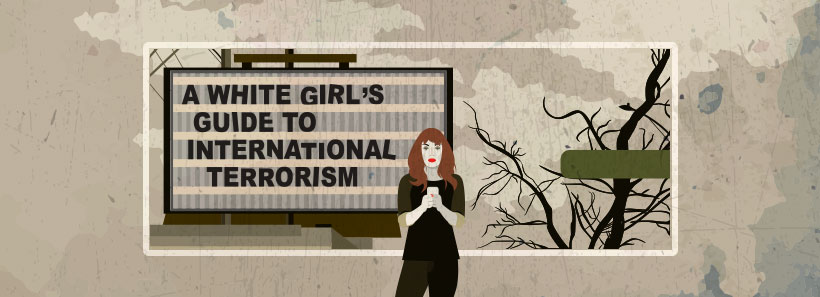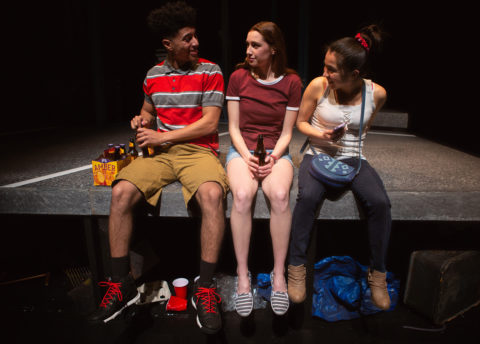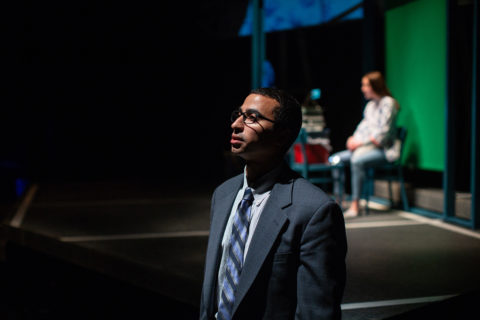
Two forces are at war in “A White Girl’s Guide To International Terrorism”: A slow, soulful social drama and a hastily paced thriller.
Commissioned as as part of San Francisco Playhouse’s developmental Sandbox Series, Chelsea Marcantel‘s script, at its best, offers a finely observed depiction of small town life on the Gulf Coast of Louisiana, an American Tragedy of drug addiction, dead-end jobs and precarious aspirations. Seventeen-year-old high school senior Blaze (Isabel Langen, nailing mercurial adolescence) lives in a trailer home with her divorced mother, Kit, a hardworking nurse who’s reluctant to let her daughter dream big, lest she crash hard (Arwen Anderson, beautifully toggling between ache and resignation).
 Blaze harbors a longtime crush on a classmate Gabe (Davied Morales). When he receives an out-of-town college scholarship in an early scene, it throws into relief Kit’s gloomy perspective that the world is divided into “the ones that leave and the ones that get left behind”—and that her daughter belongs to the latter cohort. Gabe’s nickname for Blaze is “Stick”, and yes, she’s lanky, but she’s also stuck. In the sticks. Too clever by half? Consider it foreshadowing.
Blaze harbors a longtime crush on a classmate Gabe (Davied Morales). When he receives an out-of-town college scholarship in an early scene, it throws into relief Kit’s gloomy perspective that the world is divided into “the ones that leave and the ones that get left behind”—and that her daughter belongs to the latter cohort. Gabe’s nickname for Blaze is “Stick”, and yes, she’s lanky, but she’s also stuck. In the sticks. Too clever by half? Consider it foreshadowing.
In fact, Blaze has been reaching beyond her parochial, class-bound confines for quite some time: She’s got a YouTube channel, on which she posts lively video monologues of herself portraying heroic female saints and woman warriors she’s researched in the local library, projecting intelligent, if ingenuous, fantasies about making her way out of town and making a difference in the wider world.
Even when her views, fans and trolls number only in the dozens, their far-flung provenance gives Blaze a sense of connection and potential.
Marcantel acknowledges both the positive value and the false promise of the internet in the hinterlands: Its clear that Blaze’s social media activity helps assuage her feelings of isolation, inspires her creativity, and draws her into intellectually provocative discussions unlikely to take place within her hometown circle of friends. On the other hand, watching one of those friends, Rowena (Neiry Rojo, at once immature and world-weary) fret over nude selfie etiquette and rely on an app for spiritual guidance reminds us that the iPhone, while not quite the OxyContin that’s been killing these girls’ peers and relatives, can serve as another sort of opiate.
Unfortunately, as Blaze reaches out, Marcantel overreaches. The play’s title refers to the online relationship Blaze is drawn into by Wafiya (Liz Sklar), a confident young woman who grew up in Michigan, realized that America wasn’t all it’s cracked up to be, and moved to Syria—”A paradise”— so she could marry an anti-Western extremist who, she effuses, enjoys reading books with her as they loll in a hammock.
 Conceptually, the notion of foreign terrorist groups radicalizing disillusioned Western youth is intriguing, but Marcantel never credibly shows us how that might happen. Wafiya’s text messages to Blaze amount to little more than pity party chit-chat: America is soooo bad, right? Our caliphate is way cooler! There is no sophisticated psychological gamesmanship on Wafiya’s part, no cunning manipulation of malaise into righteous anger. One of the strengths of this play is Marcantel’s complex, never-condescending portrayal of her working class characters. Blaze’s intelligence routinely trumps her inexperience. She’s quick to challenge Wafiya on a point of Islamic theology (She’s studied up at the public library) and makes it clear that she’s unwilling to wear a hijab. Yet, despite Wafiya’s pallid proselytizing and her own thoughtful pushback, Blaze works months of extra shifts at the Dairy Freeze, saving up for airfare to the middle east. Our heroine has gone full-tilt ninny. Or is it our playwright?
Conceptually, the notion of foreign terrorist groups radicalizing disillusioned Western youth is intriguing, but Marcantel never credibly shows us how that might happen. Wafiya’s text messages to Blaze amount to little more than pity party chit-chat: America is soooo bad, right? Our caliphate is way cooler! There is no sophisticated psychological gamesmanship on Wafiya’s part, no cunning manipulation of malaise into righteous anger. One of the strengths of this play is Marcantel’s complex, never-condescending portrayal of her working class characters. Blaze’s intelligence routinely trumps her inexperience. She’s quick to challenge Wafiya on a point of Islamic theology (She’s studied up at the public library) and makes it clear that she’s unwilling to wear a hijab. Yet, despite Wafiya’s pallid proselytizing and her own thoughtful pushback, Blaze works months of extra shifts at the Dairy Freeze, saving up for airfare to the middle east. Our heroine has gone full-tilt ninny. Or is it our playwright?
The Louisiana scenes that make up the meat of “White Girl’s Guide” occasionally cede to momentum-sapping monologues about terrorist recruitment, delivered directly to the audience by one Agent Salem (Mohammad Shehata). In his final speech, we realize that Salem is prosecuting Blaze. But not because she’s ended up committing acts of terrorism with her paradise pals; we learn that she never made it out of the country. Turns out “Wafiya” was Salem’s collaborator in a U.S. government entrapment scheme. Their mission: Scour the internet for young Americans who might be susceptible to extremist overtures; lure them to pledge allegiance to radical forces abroad; then arrest them as terrorists. This operation not only sounds as ill-conceived as Build That Wall, its enough to make an audience member want to bang his head against it.
 After nearly two hours of investing oneself in the compelling emotional milieu of Blaze and her Louisiana crew, the last few scenes of “White Girl’s Guide” feel like a trapdoor dumping you into another, lesser story. Far too much exposition unreels in the play’s final minutes; all of it about characters Marcantel has essentially ignored until then. Seems that Salem, an Arab-American, feels guilty having entrapped so many brown boys through his operation and wrongly relishes the opportunity to see a white girl convicted. “Wafiya”, who is white, implies that the agents have an ill-fated romantic history, further complicating their motivations. Its like a half-season of “Homeland” has arrived via shoehorn.
After nearly two hours of investing oneself in the compelling emotional milieu of Blaze and her Louisiana crew, the last few scenes of “White Girl’s Guide” feel like a trapdoor dumping you into another, lesser story. Far too much exposition unreels in the play’s final minutes; all of it about characters Marcantel has essentially ignored until then. Seems that Salem, an Arab-American, feels guilty having entrapped so many brown boys through his operation and wrongly relishes the opportunity to see a white girl convicted. “Wafiya”, who is white, implies that the agents have an ill-fated romantic history, further complicating their motivations. Its like a half-season of “Homeland” has arrived via shoehorn.
Marcantel is wrestling with a broad range of notions about identity (racial, gender, class, national) while also trying to craft an unlikely genre hybrid.
Her script is admirable in its ambition, but very clearly still in development. Here’s hoping that, within herself, Marcantel finds “A Playwright’s Guide to Prioritization and Proportion.”
Originally published in the Bay Area Reporter
